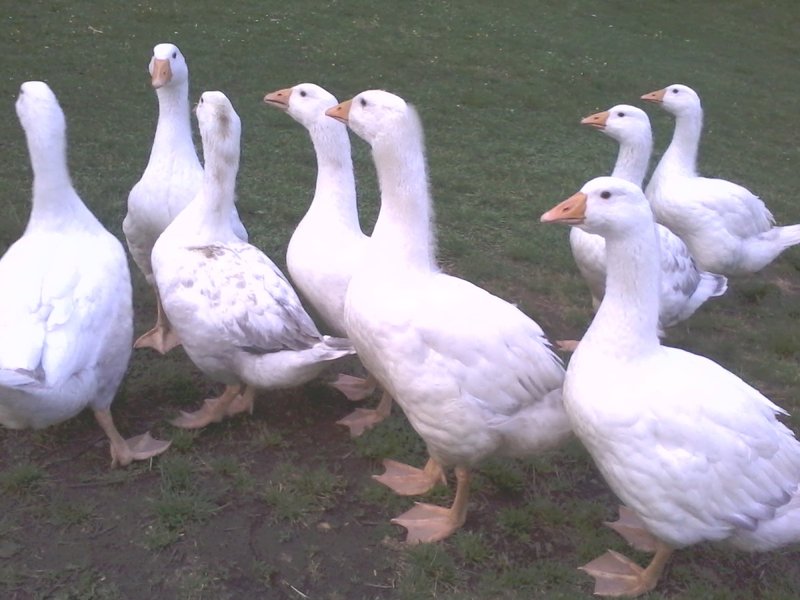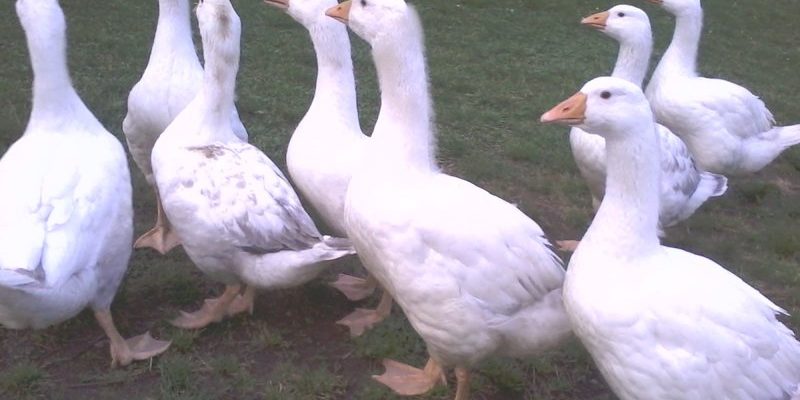
So, how do you properly care for these charming creatures? This guide will walk you through everything from their diet to their housing needs. Whether you’re thinking about adding a goose to your family or you’re already the proud owner of one, you’ll find all the practical advice you need right here, in a friendly, beginner-friendly manner.
Understanding the Breed
When it comes to domestic geese, there are several breeds, each with its unique quirks and characteristics. Some popular types include the Embden, African, and Chinese geese. Knowing your goose’s breed helps in understanding its needs and behaviors.
For instance, the Embden goose is known for its large size and good-natured temperament. If you’re looking for a gentle giant, this breed might be your best bet. On the other hand, African geese have a distinctive knob on their bills and are known for their loud honking. They can be a bit more territorial, so keep this in mind if you have other pets.
You might also wonder about their lifespan. With proper care, domestic geese can live anywhere from 10 to 25 years. Yes, that’s a long-term commitment! It’s almost like adopting a dog or a cat. Understanding these differences will help you choose the right breed for your lifestyle.
Feeding Your Goose
Feeding a domestic goose is a lot like preparing a balanced meal for a toddler—they can be picky but need proper nutrition. Grass is their favorite food, as geese are natural grazers. Providing fresh, leafy greens will keep them happy and healthy.
In addition to grass, you should offer a balanced diet that includes:
- High-quality waterfowl pellets
- Fresh vegetables like carrots and peas
- Grains such as corn or oats
- Occasional treats like fruits – think apples or berries!
Make sure they always have access to fresh, clean water. They love to dabble and play in water, so consider a shallow kiddie pool where they can splash around. This is not just for fun; it also helps them with digestion and keeps their feathers in top shape.
Here’s a pro tip: always monitor how much they eat. If you notice a sudden drop in their appetite, it could be a sign of illness. Just like us, geese can have “off” days, but consistent changes should raise a flag.
Creating the Perfect Living Environment
Geese are not very demanding when it comes to their living quarters, but they do need space to roam and explore. Ideally, you should provide a secure outdoor area for them to graze and run. A fenced yard or a large pen works well.
In terms of housing, a simple goose house can suffice. This should offer protection from predators while being well-ventilated. You want a clean, dry space where your goose can snuggle up at night. Here’s how to set it up:
- Size matters: Aim for at least 10 square feet per goose inside the house.
- Bedding: Use straw or wood shavings to keep it cozy.
- Protection: Ensure it’s secure against wild animals and harsh weather.
Try to place their house in a shady spot during hot days and ensure it’s dry during rainy seasons. Remember, a happy goose is a healthy goose!
Health and Wellness
Just like any other pet, domestic geese need regular check-ups to stay healthy. Look out for signs of illness such as lethargy, lack of appetite, or unusual droppings. Incorporating a few regular habits can help keep your feathered friend in tip-top shape.
First, make sure they’re getting their annual vaccinations. These can help prevent diseases like avian influenza. Regularly check their feet for any signs of injury or infections, as geese can be prone to foot problems.
Another important aspect of health is grooming. Geese preen their feathers to keep them in good condition, but sometimes they need a helping hand. Make sure to provide them with a dust bath area where they can clean themselves. This helps maintain their feathers and keeps pests away.
And let’s not forget about exercise! Encourage them to waddle around and explore their environment. This not only keeps them fit but also stimulates their minds.
Socialization and Behavior
Geese are social creatures and thrive in the company of their kind. If you’re planning to keep just one, you might notice that they can get lonely. Consider adopting a pair to keep them happy. Think of it like having a best friend at school—they feel more secure and less stressed.
You’ll also want to get to know their behaviors. Geese can be chatty! Their honks are a form of communication, signaling everything from excitement to warning calls. You might find them following you around, curious about what you’re doing—kind of like your own little entourage!
However, keep in mind that geese can become territorial, especially during mating season. If you’re introducing new pets to your flock, do so gradually and observe their interactions. With a little patience and understanding, you can create a harmonious environment.
Training Your Goose
Training a goose might sound odd at first, but it’s very possible! They can learn simple commands just like dogs. Start with basic commands like “come” or “stay.” Here’s how to begin:
- Use treats: Food is a great motivator. Use their favorite snacks to encourage learning.
- Be consistent: Use the same words and tone for commands to avoid confusing them.
- Practice regularly: Short, daily training sessions work best—keep it fun!
By training your goose, you not only help them learn basic commands but also strengthen your bond. It’s a great way to engage their minds and keep them entertained.
Understanding Seasonal Needs
Caring for a domestic goose means preparing for the changing seasons. In the spring, they will want to mate and nest. Be ready for some noisy honking! You can provide nesting boxes filled with straw to encourage them comfortably.
During the summer, make sure they have shade and plenty of water to stay cool. Hot weather can be tough on geese, so monitor their behavior and ensure they have options to cool down.
Fall is a time for molting. Your goose will shed old feathers and grow new ones. This process is natural, so make sure they’re getting the right nutrition to support this change.
In winter, ensure your goose has a warm and dry place to stay. You might need to insulate their house a bit more and make sure they have access to unfrozen water. Here’s the thing: geese are resilient, but they do appreciate a little care during the chilly months.
Caring for a domestic goose can be a delightful experience full of quirky moments and personal connections. By understanding their needs—be it diet, housing, or health—you can create a happy home for your feathery friend. So, grab some grass, a few treats, and get ready for a bonding experience that will fill your days with honks and happy waddles!

